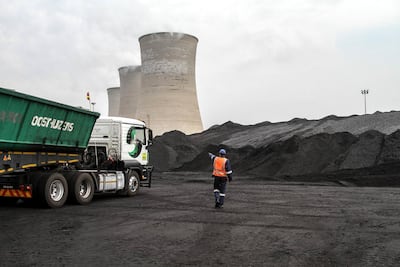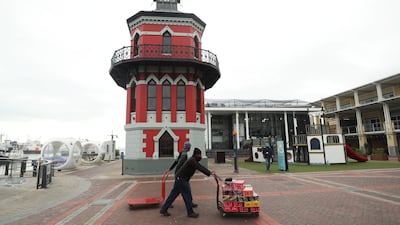The 2010s began on a positive note for the South African economy, with the country hosting the Fifa World Cup. Ten years on, it is in tatters following a decade of disaster that Covid-19 is merely exacerbating.
Ten years ago, the joyful blare of vuvuzelas emerging from football stadiums set a backdrop to overall economic exuberance and a gross domestic product growth of 4.5 per cent. Cape Town was climbing the list of the world’s favourite travel destinations and the ‘big five’ construction firms were paying handsome dividends to shareholders.
By the end of 2020, the country will be fortunate if it achieves even 1 per cent growth, with GDP predicted to reach $295 billion (Dh1 trillion) – a level last seen prior to 2010. The construction industry is in survival mode and two out of three young people are out of work.
“We are back to the second quarter 2007 GDP level and all post-2008 financial crisis growth has been wiped out,” says Isaah Mhlanga, chief economist at Alexander Forbes Investments in Johannesburg. “Tell me if this is not a depression.”
Last week, second quarter figures showed the economy shrank 51 per cent compared to the same period in 2019. The coronavirus-related lockdown – one of the strictest in the world – is partially responsible for these dismal figures. The government is working on a plan to revive the economy as conditions ease but funding will be a major obstacle.
“Where will the money come from?” President Cyril Ramaphosa said during a webcast. “The government has largely run out of money. We’ll have to cobble the money together.”
The reality is that South Africa was broke even before Covid-19 struck, entering into a technical recession in March. Ratings agency Moody’s downgraded the country’s sovereign credit rating to junk status in late March, in spite of frantic lobbying efforts by the finance ministry and Mr Ramaphosa himself.
The lockdown that followed included a ban on international arrivals, the shutdown of most businesses including the mining sector and a prohibition of cigarettes and alcohol sales, which further choked off revenue.
On September 10, Moody’s said that state tax revenue had fallen to catastrophic levels.
“The loss in revenue will be much more severe than the fall in economic activity. The smaller tax base stemming from lockdown measures, job losses and lower confidence accounts for the vast majority of the revenue shortfall,” Moody’s said.
The all-important construction industry alone suffered its eighth straight quarter of decline, said Sifiso Skenjana, chief economist at IQ Business in Johannesburg. “This is really frightening, because this is one of the sectors that is an employment multiplier and is able to employ a relatively high number of unskilled people.”
Obviously, most countries reported a collapse in GDP growth during the March-July period, but few fared as badly as South Africa. Trading partners such as India and the UK saw contractions of under 25 per cent in the same period.
“We seem to have contracted twice as much as many other countries around the world, which is quite scary,” said Mandla Isaacs, managing director of Zehuti Advisory in Johannesburg. The prohibition of the sale of clothing and e-commerce meant almost no economic activity took place and an already damaged economy simply imploded. “We don’t have the same size commerce and industry as many other countries do.”
South Africa's current state is to be partially blamed on the corruption-laden administration of Mr Ramaphosa’s predecessor, Jacob Zuma. Although he goes on trial later this year, Mr Zuma is accused among other things of having allowed associates to gain access to state-owned entities and redirecting spending for personal profit. Mr Ramaphosa himself said last year that Mr Zuma may have cost the country 500bn rand (Dh109.7bn) in corruption.
Mr Ramaphosa has pledged to put an end to corruption, but is facing an uphill task. During the lockdown, media reports emerged about political functionaries belonging to his African National Congress (ANC) party inserting themselves into personal protection equipment contracts.
“The government has been talking about rules preventing elected politicians and officials from participating in state contracts,” said Nicky Weimar, chief economist at Nedbank, a financial services group in Johannesburg. “This is a rule all over the world and they need to implement this now.”

To add to its woes, the state-run electricity utility Eskom has once again resumed power cuts. Citizens and industry are growing accustomed to hours of ‘loadshedding’, when the company schedules cuts to take pressure off its ailing fleet of mostly coal-fired stations.
The power cuts are highly damaging to South Africa’s industrial sector, costing up to 118bn rand last year, according to economists' estimates. Analysts have been pleading for the private sector to be allowed into the energy grid, to help alleviate the shortage.
Eskom has perhaps become a symbol of the ANC’s inability to confront urgent reforms. The party itself is fiercely divided over whether private competition should be allowed. In the meantime, the utility limps along under a massive $40bn debt load and is unable to provide a reliable service.
“Government can do a lot to restore confidence, by opening up that market to competition,” Ms Weimar said. “Not just say you are going to do it, but to really go ahead and do it.”

